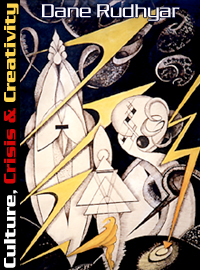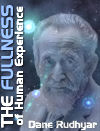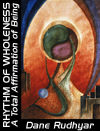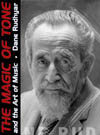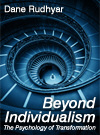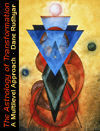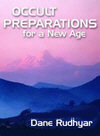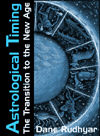Culture, Crisis & Creativity
by Dane Rudhyar
1. Where Do We Stand?
The great Hindu holy man, Sri Ramana Maharshi, demanded of all those who came to him for spiritual guidance that they ask of themselves what he considered the most basic question: "Who am I."
The German philosopher, Martin Heidegger, built his book An Introduction to Metaphysics around what he thought was the fundamental question in philosophy: "Why is there anything, instead of nothing?" Today, I believe, another question has acquired an essential meaning and a character of urgency: "What is my stand toward the culture which has formed me, the questioner?"
Any question has to be formulated in words. Words belong to a language which is the most primordial expression of a culture. This culture forms the mind of the child and crystallizes a set of values, a type of thinking, a way of life, which is forced upon the child from birth by the example and the language of those who surround and direct the development of his consciousness; thus, in the broadest sense, psychic and mental as well as physical, his environment.
Sri Ramana Maharshi's question asked of Hindus, by a Hindu of Southern India and in an Indian environment, is loaded with millennia of Hindu concepts, devotional feelings, images and values. If this question is asked in English, it implies that "foreigners" from another culture have come to India seeking in the country they once conquered and pilfered, spiritual values which they feel are no longer present in the Anglo-Saxon culture. It is this historical background which gives to the question its true and vital character of urgency. It is not asked in the abstract—that is, in a historical vacuum. It is asked by a Hindu today, to individuals living today, whose coming to India in the first place implies an unvoiced question. In the spiritual fashion, the Hindu Sage answers by asking another question. The question means: "Why have you come to me in India? What it is essential for you to discover is who you think and feel you are as an I." Such a discovery can be pertinent if the would-be disciple of the Hindu yogi thoroughly understands that he was impelled to go to India by the present state of his culture and the manner in which, consciously or unconsciously, he is reacting to it. And if Sri Ramana's question is addressed to a modernized Hindu devotee it spurs him to return to the ancient Indian realization of atman, the transcendent Self.
The German philosopher, Heidegger, lecturing in a University between the two World Wars, sought to impress his students with an urgent need to study and reconsider with a free, unconditioned mind what he considered the primary source of our Western civilization, the Greek culture which preceded Plato—especially the Greece of Heraclitus and Parmenides. He felt that European culture had lost the deeper meaning of what he called "being" (Sein) and had misinterpreted the essence of the Greek philosophical tradition. He saw European culture becoming increasingly materialized, superficialized, and vulgarized. He sought therefore to sound again the original keynotes of Western civilization as the great minds of ancient Greece had tried to formulate them in an especially expressive and, in his view, "spiritual" language. Therefore Heidegger's question should also be seen in its historical context. It asks German students to return to the root-concept of "being," the loss of which in Christian European culture—he felt —had drastic repercussions; these now should be thoroughly understood and evaluated in all their implications.
But India is not limited to one tradition. When Gautama, the Buddha, in the sixth century B.C. taught what is now known as the anatma doctrine, he challenged the old Hindu concept of atman and denied the reality of a permanent and transcendent entity somehow superior to man's existential being. His aim presumably was to break down the crystallized form which the concept of an individualized atman had taken in the collective consciousness of the India of his time. To this end he presented an existential approach to the meaning of selfhood in which the compound nature of the human and the absolute power of karma were emphasized. Also, if we consider the problem of "being" which preoccupied Heidegger, we should realize that, while this problem has haunted the mind of most European philosophers, it may have become relatively irrelevant to the American mind trying to emerge from intellectual bondage to the old Greco-European concepts and to develop a new, more inclusive philosophy of existence. In such a philosophy, being and nonbeing cannot be separated, any more than in Chinese philosophy Yang can be separated from Yin.(1)
The problem we are facing today, not only in the Western world but all over the globe, is how to constructively and significantly evaluate our present-day position as we deal with the ideas and the values we have inherited from the past, that is, from cultures which should no longer demand our total and unquestioning allegiance because either they have lost their existential base of operation—thus their roots and their actual livingness—or they have seen their relevance to the contemporary conditions of existence radically challenged by a tide of vulgarization and rebellion against all formal cultures. This is the reason for the question I have posed. This question confronts every thinking person with the imperative need to try to evaluate objectively and in terms of the world-situation the character of his or her relationship to the national culture in which he or she has been born and educated. This culture—as impressed upon our nascent consciousness by parents and teachers—not only surrounds and affects us now physically and socially; it has conditioned, if not totally determined, our mode of thinking and our feeling-responses. It has formulated for us our conscious or unconscious answer to the philosophical problem of the nature and purpose of existence. It has provided us with basic religious beliefs which we have used in building our "self-image."
Today we can no longer blindly accept any of the formulations of past traditions. We have to ask basic questions, for whatever a human mind considers obvious and unquestioningly takes for granted imprisons that mind, however beautiful the prison walls may be. At first human beings are bound by their culture, its language and its traditional way of life, almost as inescapably as they are bound by biological imperatives (hunger, self-aggrandizement, sex, etc.) But a time comes in the evolution of human societies when the development of kingdoms and cities, travel, commerce, and intermarriage bring tensions, internal conflicts, and a state of confusion. The "self-evident" truths and paradigms, the traditions, the once-revered institutions of the culture, become shells, mostly irrelevant, empty of meaning, and binding to ever more individualized and restless persons. As the culture reaches such a critical point in its evolution, the individual person is confronted with the need to make a choice. Different and often sharply divergent paths present themselves to minds open and sensitive enough to realize—however dimly—that immobility means death. They must move on.
They should realize, but most often do not, that the character and orientation of the paths from which they must choose are defined primarily by the manner in which they relate to the familiar culture. They can do this consciously, if they are able to think objectively and to feel deeply; or they choose unconsciously, if—being still unaware, confused, or afraid—they feel compelled to accept implicitly, or dare not question, the validity of the social, cultural, and religious attitudes of their parents or group of friends. In such a situation, the most decisive factor is the individual's ability or inability to conceive, vividly imagine, or intuitively envision a frame of reference for human life and consciousness transcending the strictly cultural level.
What is implied by a transcultural level of consciousness and activity will be discussed throughout this book. In the next chapter a contrast will be drawn between "culture" and "civilization," placing these much used and abused words in a relatively new historical or evolutionary context. Here I shall only state that in our moment of worldwide crisis a deeper and more inclusive—and even a more cosmic—use of the term civilization is imperative, if we are not to entirely lose our faith in the value of what we call "Western civilization."
Civilization, in the context of the "cosmic" philosophy of existence which I have presented in a number of books, is a process of planetary scope. It affects the whole Earth and mankind as a whole. Therefore I do not speak of this or that "Civilization" as the English historian, Toynbee, does, but of a global process of civilization which began in man's ancient past. However, it was not until a relatively recent date that this process could operate in a focalized and public manner. The turning point was the sixth century B.C.—the century in which Gautama the Buddha, the last Zoroaster (the esoteric Parsee tradition speaks of a series of 12 Zarathustras extending over many millennia) Pythagoras, probably Lao-tze, and other great spiritual leaders lived and sought to fecundate the minds of a few receptive men with a radically new approach to the meaning and possibilities of human existence.
Some six hundred years later Jesus, and in India the seer-philosophers of Mahayana Buddhism, added an essential touch to the process. But just as Greek philosophers and statesmen had betrayed the deeper spirit of the revolution of thought that had given to the mind of man a central and dominant importance, so Christ's vision of universal love and the compassionate ideal of the Bodhisattva became perverted. The institutionalized and dogmatic Catholic Church gave refuge to the negative aspect of Greek rationalism and could not stop European people from using religion to give an aura of sanctity to their crude and violent egocentric passions—the worst instances being the Inquisition and the wars of religion. The quest for God burning in the souls of a few mystics turned into the craving for gold which led the Spanish conquistadors to the brutal conquest of America and the genocidal torturing of thousands of human beings; the treatment of Native Americans during and after the conquest of the land, as well as the gold rush, did not show much more of the Christ's spirit of universal love. What we call "Western civilization" has been built on the basis of an intellectualistic and analytical mind—concerned since the Renaissance with the control of material forces for the improvement of man's physical everyday living—and a restless drive for change and egocentric expansion. The Euro-American society has produced technological wonders and enormous cities filled with violently competitive, atomistic, and proud egos whose greed for material power and conquest knows no limits. We call all this individualism, freedom, equality—and civilization. Yet it is only the shadow aspect of the first phase of the public and worldwide attempt at establishing the collective consciousness of mankind at a level transcending the compulsive realm of biological values and instinctual imperatives—the realm in which cultures are born, mature, crystallize, and die.
Civilization is not the opposite of culture. The process of civilization interacts with the genesis and development of local cultures all over the globe. We need to understand how this interaction operates, and how metabiological and spiritual modes of activity are able to transform and dephysicalize the products of land-based and always local cultures, and the purpose of such a transformation. This is today a matter of extreme importance, for only such an understanding can help us to attune the deepest area of our being and consciousness to planetary and cosmic rhythms revealing, behind the tragedies of our social, cultural, and personal crises, the vast and imperturbable Harmony, foundation of all existence.
In moments of ecstasy, and in some cases through what is loosely called "meditation," the consciousness of a particularly sensitive and open person may resonate to the normally inaudible "Sound" which can also break upon the mind as transcendent light, but when this seemingly timeless experience ends—as it always must—what of the aftermath? How will the ego-mind deal with it?
Whether the after-effect of the transcendent experience will prove truly constructive or confusing, not only for the experiencer but for those to whom it will be emotionally or verbally conveyed, always depends upon both the cultural level and the mental-emotional state of the experiencer, and the condition of the culture at the time. However universal and seemingly timeless Spirit is understood essentially to be, the acts of this Spirit—and as a result the "revelations" dispensed to human beings—deal always with particular persons and particular situations. The outcome of these acts and revelations depends upon the answers which a particular individual, implicitly if not explicitly, gives to the fundamental question: Where do you stand, here and now?
1. For a discussion of this concept, read my book The Planetarization of Consciousness , especially Part Two (Aurora Press, paperback edition, 1969.) Return
2. Culture-Wholes & the Process of Civilization
Copyright © 1977 by Dane Rudhyar.
All Rights Reserved.
See Notices for full copyright statement and conditions of use.
Web design copyright © 2000-2004 by Michael R. Meyer.
All Rights Reserved.


